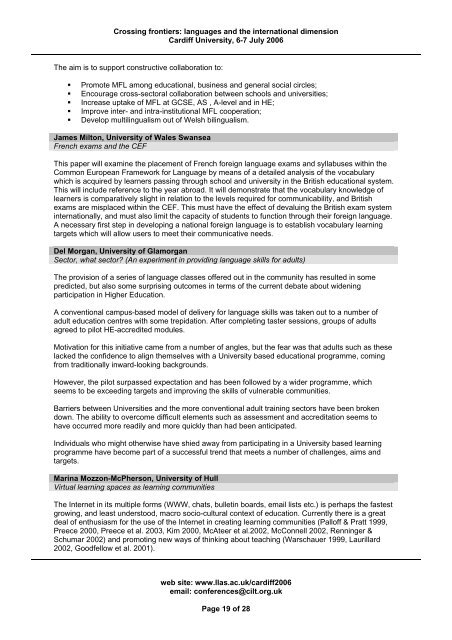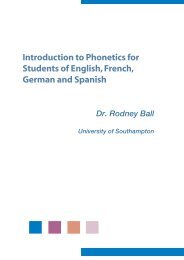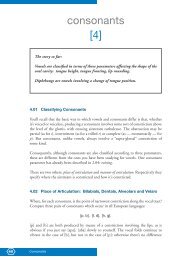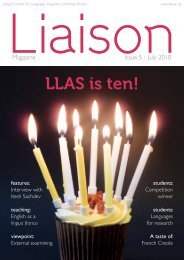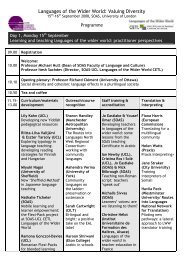Crossing frontiers: Languages and the international dimension
Crossing frontiers: Languages and the international dimension
Crossing frontiers: Languages and the international dimension
You also want an ePaper? Increase the reach of your titles
YUMPU automatically turns print PDFs into web optimized ePapers that Google loves.
<strong>Crossing</strong> <strong>frontiers</strong>: languages <strong>and</strong> <strong>the</strong> <strong>international</strong> <strong>dimension</strong><br />
Cardiff University, 6-7 July 2006<br />
The aim is to support constructive collaboration to:<br />
� Promote MFL among educational, business <strong>and</strong> general social circles;<br />
� Encourage cross-sectoral collaboration between schools <strong>and</strong> universities;<br />
� Increase uptake of MFL at GCSE, AS , A-level <strong>and</strong> in HE;<br />
� Improve inter- <strong>and</strong> intra-institutional MFL cooperation;<br />
� Develop multilingualism out of Welsh bilingualism.<br />
James Milton, University of Wales Swansea<br />
French exams <strong>and</strong> <strong>the</strong> CEF<br />
This paper will examine <strong>the</strong> placement of French foreign language exams <strong>and</strong> syllabuses within <strong>the</strong><br />
Common European Framework for Language by means of a detailed analysis of <strong>the</strong> vocabulary<br />
which is acquired by learners passing through school <strong>and</strong> university in <strong>the</strong> British educational system.<br />
This will include reference to <strong>the</strong> year abroad. It will demonstrate that <strong>the</strong> vocabulary knowledge of<br />
learners is comparatively slight in relation to <strong>the</strong> levels required for communicability, <strong>and</strong> British<br />
exams are misplaced within <strong>the</strong> CEF. This must have <strong>the</strong> effect of devaluing <strong>the</strong> British exam system<br />
<strong>international</strong>ly, <strong>and</strong> must also limit <strong>the</strong> capacity of students to function through <strong>the</strong>ir foreign language.<br />
A necessary first step in developing a national foreign language is to establish vocabulary learning<br />
targets which will allow users to meet <strong>the</strong>ir communicative needs.<br />
Del Morgan, University of Glamorgan<br />
Sector, what sector? (An experiment in providing language skills for adults)<br />
The provision of a series of language classes offered out in <strong>the</strong> community has resulted in some<br />
predicted, but also some surprising outcomes in terms of <strong>the</strong> current debate about widening<br />
participation in Higher Education.<br />
A conventional campus-based model of delivery for language skills was taken out to a number of<br />
adult education centres with some trepidation. After completing taster sessions, groups of adults<br />
agreed to pilot HE-accredited modules.<br />
Motivation for this initiative came from a number of angles, but <strong>the</strong> fear was that adults such as <strong>the</strong>se<br />
lacked <strong>the</strong> confidence to align <strong>the</strong>mselves with a University based educational programme, coming<br />
from traditionally inward-looking backgrounds.<br />
However, <strong>the</strong> pilot surpassed expectation <strong>and</strong> has been followed by a wider programme, which<br />
seems to be exceeding targets <strong>and</strong> improving <strong>the</strong> skills of vulnerable communities.<br />
Barriers between Universities <strong>and</strong> <strong>the</strong> more conventional adult training sectors have been broken<br />
down. The ability to overcome difficult elements such as assessment <strong>and</strong> accreditation seems to<br />
have occurred more readily <strong>and</strong> more quickly than had been anticipated.<br />
Individuals who might o<strong>the</strong>rwise have shied away from participating in a University based learning<br />
programme have become part of a successful trend that meets a number of challenges, aims <strong>and</strong><br />
targets.<br />
Marina Mozzon-McPherson, University of Hull<br />
Virtual learning spaces as learning communities<br />
The Internet in its multiple forms (WWW, chats, bulletin boards, email lists etc.) is perhaps <strong>the</strong> fastest<br />
growing, <strong>and</strong> least understood, macro socio-cultural context of education. Currently <strong>the</strong>re is a great<br />
deal of enthusiasm for <strong>the</strong> use of <strong>the</strong> Internet in creating learning communities (Palloff & Pratt 1999,<br />
Preece 2000, Preece et al. 2003, Kim 2000, McAteer et al.2002, McConnell 2002, Renninger &<br />
Schumar 2002) <strong>and</strong> promoting new ways of thinking about teaching (Warschauer 1999, Laurillard<br />
2002, Goodfellow et al. 2001).<br />
web site: www.llas.ac.uk/cardiff2006<br />
email: conferences@cilt.org.uk<br />
Page 19 of 28


